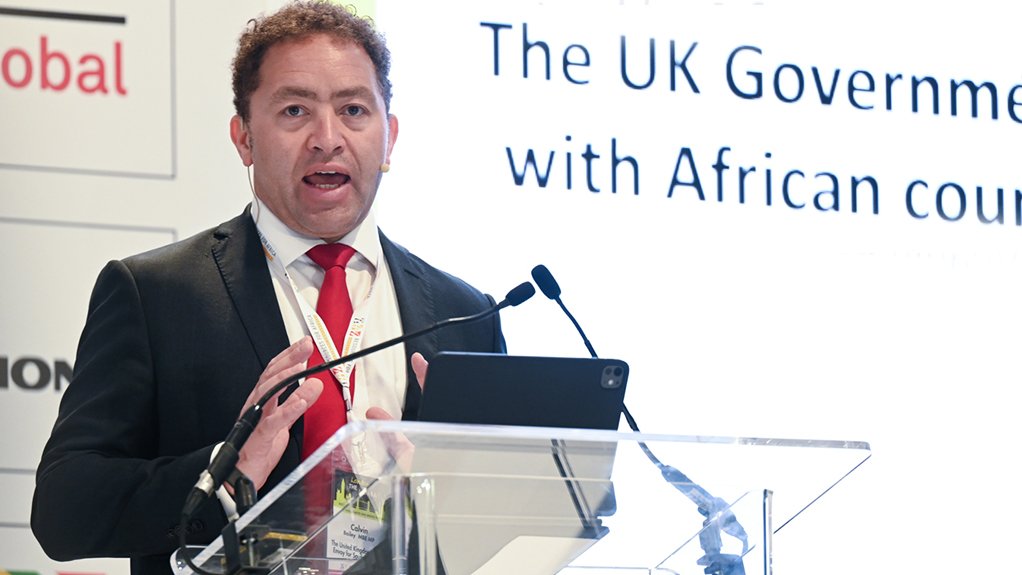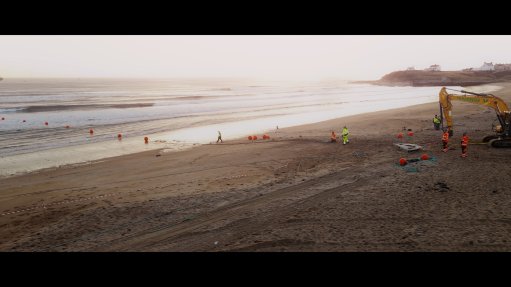UK committed to fresh value-adding mining approach, says Southern African envoy
JOHANNESBURG (miningweekly.com) – The UK government is promising Africa a fresh in-Africa value-adding approach to the mining and minerals development it will be going all out to partner and promote.
This promise was spelt out firmly this week by UK trade envoy for Southern Africa Calvin Bailey, MP.
In a zealous keynote address at the London Indaba, Bailey pointed out that many of the crucial minerals vital to key green technologies were particularly present in Southern Africa, his area of interest.
The panel discussion in which Bailey took part was moderated by Herbert Smith Freehills Africa chairperson, South Africa’s Peter Leon, and took place at this week’s London Indaba, which is organised by South Africa’s Resouces4Africa and chaired by mining luminary Bernard Swanepoel.
“Here in the UK, our government is setting out its plans for economic growth to make Britain a clean energy superpower,” Bailey revealed.
The industrial strategy, published this week, aims to grow UK sectors such as advanced manufacturing, defence, clean energy and digital technology industries, which rely on critical mineral supplies.
“This is also a central part of the UK’s Strategic Defence Review. A secure supply of critical minerals is a key enabler for these visions and strategies.
“This is why this summer, the Department of Business and Trade will publish its new industrial strategy and critical minerals strategy that will drive forward the green industries of the future and help secure our supply chains for the long term.
“The new critical minerals strategy will refine the UK's approach to its domestic production of critical minerals, including developing our own strengths in midstream processing and recycling.
“It will also support the aims of the UK's new circular economy strategy, driving ambitious reforms to promote recycling and retention of critical minerals,” Bailey told attendees at the event covered by Mining Weekly.
He emphasised the UK government’s seriousness about optimising its own domestic critical minerals capabilities, “producing more and better in the UK”.
This, he said, was why, through the National Wealth Fund, the UK had invested £28-million in the South Crofty tin project, which was being developed by Cornish Minerals, and £24-million in the Cornish Lithium Travelamore project to mine and refine better grade lithium in the UK.
“However, the UK cannot achieve its critical minerals goals alone,” Bailey pointed out.
Strategic international collaboration would, he said, be essential to meet the supply needs of UK growth businesses and to promote the global resilience of responsible and sustainable supply chains.
“The new strategy will set out our plans to build targeted growth partnerships with key allies, including resource-rich nations across the Africa continent.
“The strategy will also cement our commitment to multilateral cooperation on critical minerals through fora like the G20 and the Mineral Security Partnership (MSP) forum,” Bailey explained.
The promising G20 Summit that South Africa is hosting in Johannesburg on November 22 and 23, will be attended by Argentina, Australia, Brazil, Canada, China, France, Germany, India, Indonesia, Italy, Japan, Republic of Korea, Mexico, Russia, Saudi Arabia, South Africa, Türkiye, the UK, and the US.
Through the multilateral G20 and the bilateral MSP engagements, the UK would, Bailey said, seek to deploy UK export finance for overseas projects that supplied critical minerals, as well as for products that contained critical minerals to the UK, fuelling the UK’s net-zero energy transition.
The strategy would, Bailey added, also set out how international partners could benefit from the UK's strengths, ranging from the City of London as a global centre for mining finance and commodities training, to Britain’s research and development academia and the know-how of the Camborne School of Mines, the British Geological Survey, and a network of universities that developed critical mineral innovations.
The UK, he promised, would go all out to ensure that critical minerals were produced “responsibly, sustainably and transparently, protecting local communities and their environments”.
“We want African nations to play a key part in our critical mineral strategy. Many of the critical minerals vital to technologies are present in particularly, my area of interest, Southern Africa.
“We also know that the countries holding significant deposits of critical minerals want a greater share of the value from these resources and the UK will continue to advocate for value addition on African soil.
“UK businesses are investing in Africa. They are actively exploring, producing and refining minerals across Africa.
“Many uphold corporate governance structures that promote transparency and accountability in their operations. I've taken great pride in visiting some of these operations myself and will do in others across the region. These, in turn, help to ensure taxes are paid, skills are transferred, local jobs are created, the environment is protected, and communities are substantially and significantly engaged.”
The UK Department of Business and Trade’s support of Africa’s mining ecosystems formed part of the UK’s wider commitment to mutually beneficial partnerships within Africa and in November, the UK Foreign Secretary had announced the government's commitment to “a fresh approach to Africa”.
The aim would be to build a long-term strategy to 2035 focusing on strengthening sustainable and inclusive growth and economic transformation, tackling the climate crisis and addressing insecurity.
In the last six months, the UK government had been consulting with potential African partners and later this year, it would set out how Britain would work with African countries.
“This will be a whole-of-government approach which will build long-term, respectful partnerships that deliver on shared UK and African priorities.
“I believe there is great potential for us to create new opportunities for investment into Africa, sharing of UK expertise in the mining and mineral sector and the creation of new value chains that promote economic growth in the UK and in Africa.
“I look forward to working with you on these very exciting opportunities.” Bailey enthused.
Article Enquiry
Email Article
Save Article
Feedback
To advertise email advertising@creamermedia.co.za or click here
Comments
Announcements
What's On
Subscribe to improve your user experience...
Option 1 (equivalent of R125 a month):
Receive a weekly copy of Creamer Media's Engineering News & Mining Weekly magazine
(print copy for those in South Africa and e-magazine for those outside of South Africa)
Receive daily email newsletters
Access to full search results
Access archive of magazine back copies
Access to Projects in Progress
Access to ONE Research Report of your choice in PDF format
Option 2 (equivalent of R375 a month):
All benefits from Option 1
PLUS
Access to Creamer Media's Research Channel Africa for ALL Research Reports, in PDF format, on various industrial and mining sectors
including Electricity; Water; Energy Transition; Hydrogen; Roads, Rail and Ports; Coal; Gold; Platinum; Battery Metals; etc.
Already a subscriber?
Forgotten your password?
Receive weekly copy of Creamer Media's Engineering News & Mining Weekly magazine (print copy for those in South Africa and e-magazine for those outside of South Africa)
➕
Recieve daily email newsletters
➕
Access to full search results
➕
Access archive of magazine back copies
➕
Access to Projects in Progress
➕
Access to ONE Research Report of your choice in PDF format
RESEARCH CHANNEL AFRICA
R4500 (equivalent of R375 a month)
SUBSCRIBEAll benefits from Option 1
➕
Access to Creamer Media's Research Channel Africa for ALL Research Reports on various industrial and mining sectors, in PDF format, including on:
Electricity
➕
Water
➕
Energy Transition
➕
Hydrogen
➕
Roads, Rail and Ports
➕
Coal
➕
Gold
➕
Platinum
➕
Battery Metals
➕
etc.
Receive all benefits from Option 1 or Option 2 delivered to numerous people at your company
➕
Multiple User names and Passwords for simultaneous log-ins
➕
Intranet integration access to all in your organisation




















